vehicle
Latest
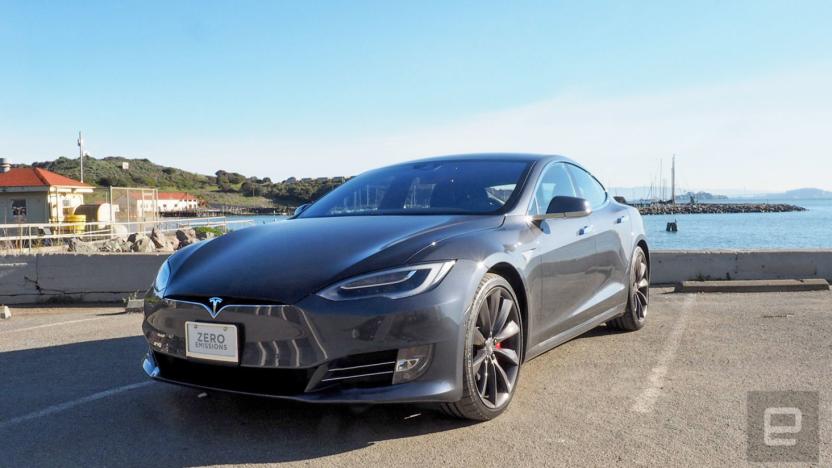
Tesla cuts the price on its entry-level Model S by $5,000
Just because Tesla is ditching the Model S 60 and 60D doesn't mean that you'll be paying dramatically more to own the luxury electric sedan. Tesla has cut the price on its current entry-level models, the 75 and 75D, by $5,000. It's still $1,500 more expensive than the outgoing model at $69,500, but not so much so that you might balk if you were seriously considering the 60 before. It's certainly a better value if you were already looking at a 75 for the extra range. On top of that, Tesla is sweetening the pot by making key features standard.
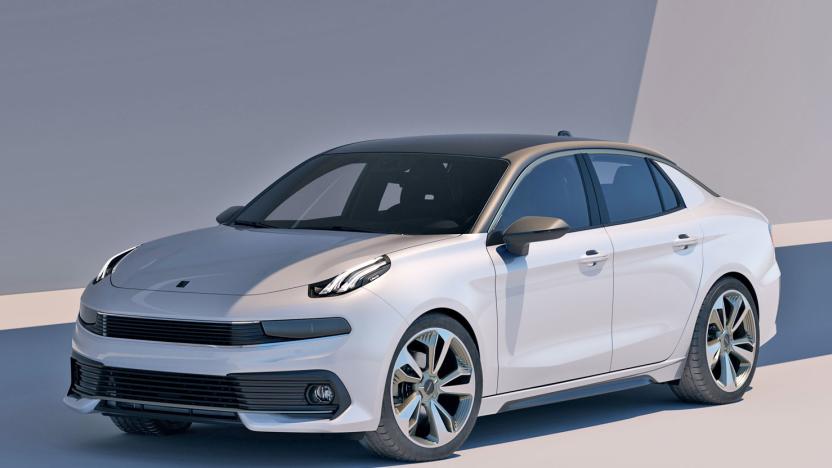
Lynk & Co unveils its second take on a shareable car
Lynk & Co might have only shown off its first tech-laden vehicle half a year ago, but it's already set for a follow-up... and then some. The Geely-owned brand has unveiled the 03 Concept, a sedan sibling to the 01 Concept crossover (which has also reached its production-ready form). While the design won't shock you -- it's really a lower-profile 01 -- this brings Lynk & Co's combination of technology and unique business models to a wider audience. The centerpiece remains a Microsoft/Alibaba-designed infotainment system with built-in car sharing support, which lets you lend your car to others through a smartphone app. However, there are also some new wrinkles in paying for Lynk & Co's cars that could be as important as the cars themselves.
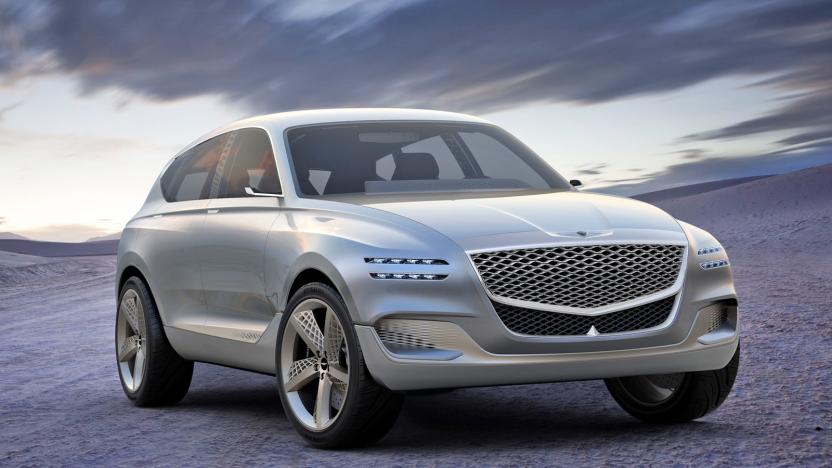
Prototype Genesis SUV melds hydrogen and plug-in power
It hasn't even been two years since Hyundai spun out its Genesis luxury badge as a separate division, but the new group is already making a name for itself. Genesis has unveiled its first experimental SUV, the GV80 Concept, and the prototype clearly pushes a few boundaries. For one, it's a plug-in fuel cell hybrid. The company isn't talking performance figures at this point, but the combination of electric and hydrogen power promises zero-emissions driving while still delivering a healthy range.
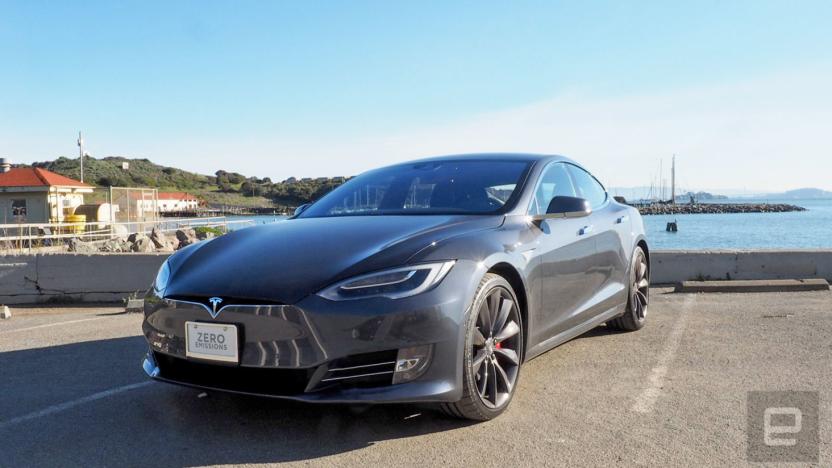
Tesla overtakes GM to become the most valuable US car maker
Tesla just managed a symbolic but important win in its quest to make electric cars popular. Shortly after the start of trading on April 10th, Tesla's stock market cap overtook that of GM -- it was worth about $51 billion, or $1.7 billion more than its established rival. While it's not clear that this will last (we've seen some give and take as of this writing), it's no mean feat for a company that has made just three car models in its brief 13-year history. The big question is whether or not Tesla can back up that value with raw sales numbers.
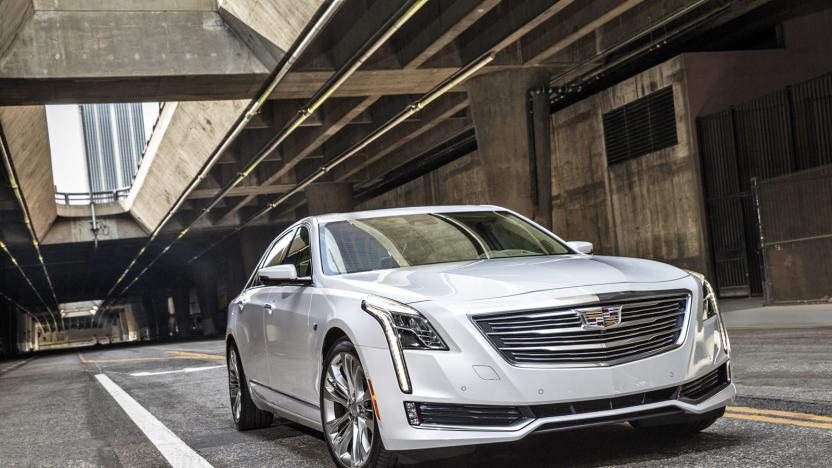
Cadillac unveils its answer to Tesla's semi-autonomous tech
Outside of Tesla, semi-autonomous driving modes are still quite rare. GM, however, wants to make it relatively mainstream. The upcoming 2018 Cadillac CT6 (due this fall) will be the company's first car with Super Cruise, a technology that can take over during highway drives. If you believe the Cadillac crew, this is the first production car with "true" hands-free driving. Where Tesla's newer Autopilot versions require that you keep your hands on the wheel, Cadillac only requires that you look at the road. An infrared camera on the steering column tracks your head to make sure you're paying attention, and the vehicle will send alerts or even bring the car to a stop if you won't (or can't) keep your eyes forward.
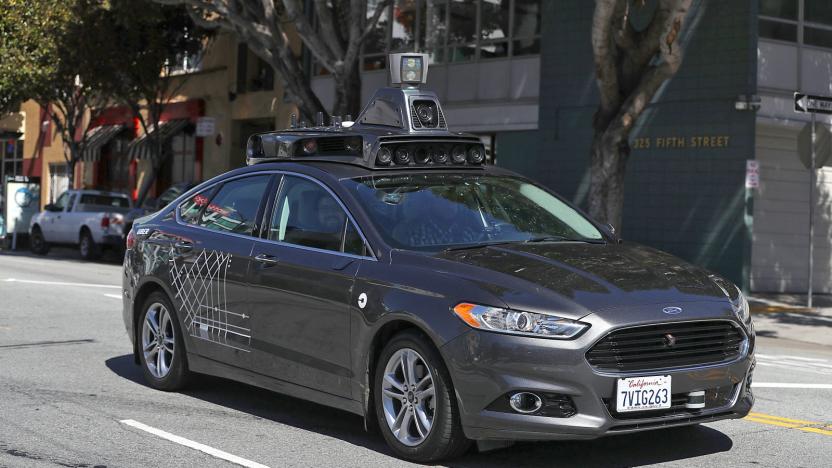
Alphabet bests Uber in self-driving car reliability
It's no secret that Uber's young self-driving car program still needs work, but how does it stack up next to efforts from others? Not so well, it seems. California's Department of Motor Vehicles has published stats showing that Alphabet's Waymo is well ahead of the pack. While Uber's data (not part of the DMV report) shows that its autonomous system disengages about once every mile, Waymo's only requires human intervention once every 5,128 miles. Nissan's system, meanwhile, disengages once every 146 miles.

Toyota is using AI to hunt for new battery materials
Toyota has turned to artificial intelligence for help in the hunt for new advanced battery materials and fuel cell catalysts. The Toyota Research Institute (TRI) is investing $35 million into the project and is teaming up with various institutions and companies, including MIT and Stanford University. According to the automaker's research devision, materials development usually spans decades. By using artificial intelligence techniques, such as machine learning, the researchers can reduce the time it takes to conjure up new materials it wants to use for future zero-emission and carbon-neutral vehicles.
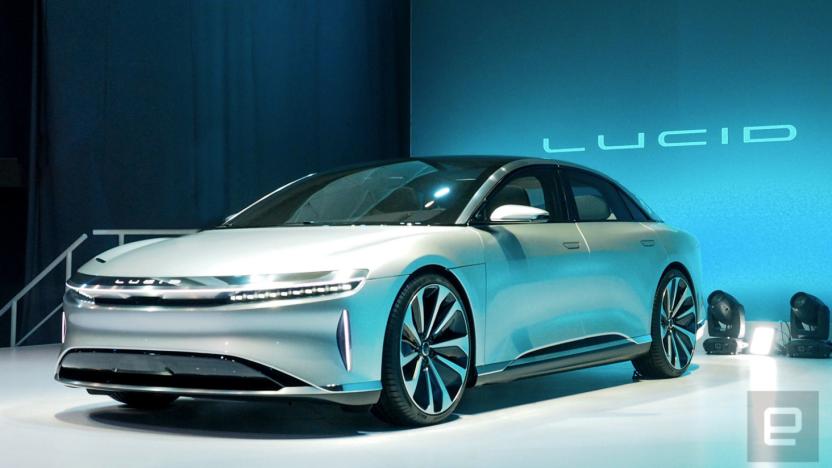
Lucid's luxury electric car will start at $52,500
When the Lucid Air made its debut late last year, all the hype over the electric car's trick features was countered by one overriding question: would the price be anywhere near competitive with that of the Tesla Model S? Apparently, the answer is a solid "yes." Lucid has revealed that the Air will start at $52,500, slotting it in well under the Model S (which starts at $71,300 as of this writing) and above the upcoming Model 3. You'll get quite a bit for the money, too, although there will clearly be incentives to splurge.
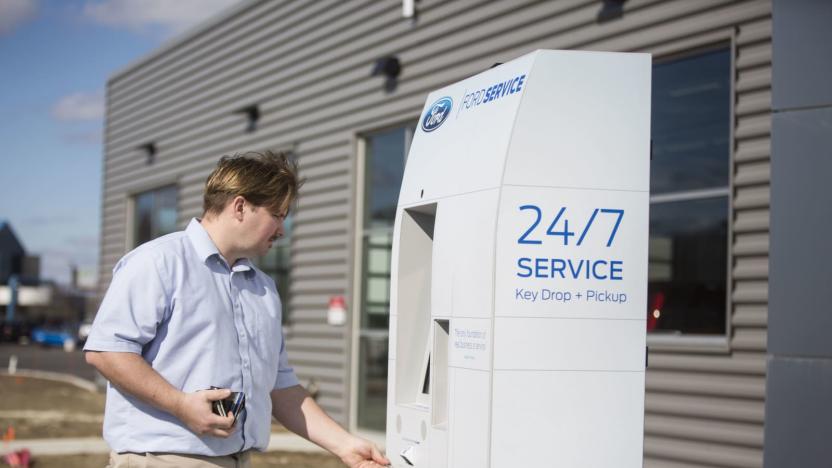
Drop your Ford off for service 24/7 using these automated kiosks
The march toward "automated everything" continues apace. Wendy's is putting thousands of self-ordering machines in its restaurants, and now Ford is trying out a similar strategy, but, you know, for cars. The company announced it has partnered with Panasonic and GoMoto, which specializes in car dealership technologies, to create so-called Smart Service Kiosks.

'No Man's Sky' teases a new way to roam your home planet
Exploring your home planet in No Man's Sky is about to get easier. Hello Games has announced it's adding a new vehicle to the space sim in its upcoming "Path Finder" update.

ICYMI: Ford's Autolivery is the future of delivery
Today on In Case You Missed It: Ford used virtual reality to demo its "Autolivery" concept service at Mobile World Congress. The package delivery system of the future would consist of a self-driving van and a drone working together to deliver parcels and orders right to your door -- even if your door is on the 30th floor. While it's unlikely that anyone will see this system in action for several years -- the company anticipates the fleet won't be ready until at least 2021 -- it would go a long way to reducing urban gridlock and pollution.

Self-driving car race finishes with a crash
Fans attending Formula E's Buenos Aires ePrix got a nice treat: the first 'race' between self-driving cars on a professional track, courtesy of a test from Roborace. Only... it didn't quite go according to plan. Roborace's two test vehicles (known as DevBots) battled it out on the circuit at a reasonably quick 115MPH, but one of the cars crashed after it took a turn too aggressively. The racing league was quick to tout the safety advantages of crashing autonomous cars ("no drivers were harmed"), but it's clear that the tech is still rough around the edges.
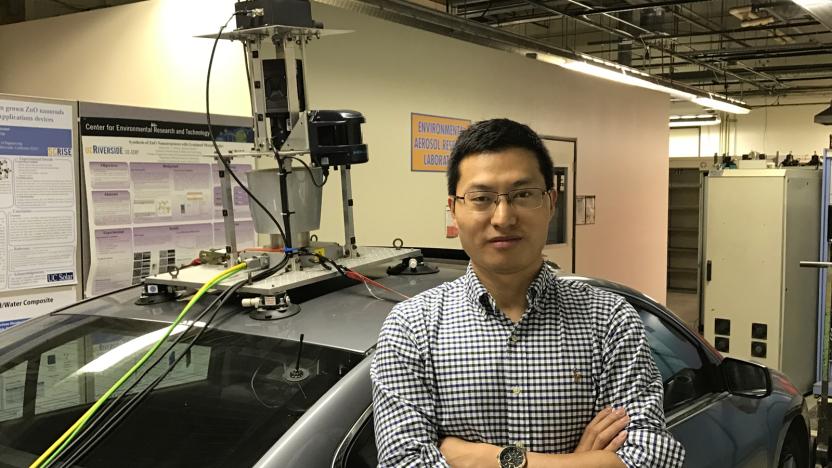
Hybrid cars can save fuel through nature-like algorithms
Plug-in hybrid cars aren't as efficient as they could be. While starting in a pure electric mode is good for relatively short trips, it actually hurts your fuel economy if you have to switch to the gas engine. Science may have a solution, though, and it's taking its cue from nature. University of California, Riverside researchers have developed evolutionary algorithms that learn to combine electric and gas power for maximum fuel economy. The approach mimics natural energy-saving processes to invoke the electric motor throughout the trip, and adapts based on your driving conditions -- it should help whether you're stuck in downtown traffic or cruising effortlessly on the highway.

Tesla hires key designer behind Apple's new MacBook Pro
Apple's Swift language architect isn't its only high-profile team member to have jumped ship for Tesla in recent memory. The 9to5Mac team has discovered that Matt Casebolt, a product design director for Apple, left the company in December to become a senior engineering director for "closures & mechanisms" at Tesla. It's not clear exactly how he'll shape Tesla design, but you'll definitely recognize his Apple work -- he was key to the designs of everything from the MacBook Air through to the current Mac Pro and new MacBook Pro.

Volvo is testing self-driving cars with real families
Picture a self-driving car test in your head and you probably see an engineer or two scrutinizing data... and no one else. Everyday people, if they're present at all, tend to be relegated to the back seat. Volvo is trying something different: it just revealed that it's conducting autonomous vehicle tests with an ordinary family, the Hains from Gothenburg, Sweden. The four-person household is convenient for marketing, of course (we care about people!), but they serve an important purpose: they'll help Volvo understand how non-engineers deal with self-driving tech. How do they react when the car switches between manual and autonomous modes, and what do they do at those times when they aren't taking the wheel?

Google and Fiat Chrysler work together on Android car tech
The team-up between Google and Fiat Chrysler is about to extend well beyond self-driving minivans. The two companies have revealed an 8.4-inch Uconnect concept system based on Android. No, not Android Auto -- we're talking full-fledged Android Nougat. While it still uses the familiar Uconnect interface (for better or for worse), the Android underpinnings give it "seamless integration" with core Google services like Assistant and Maps. It should play nicely with third-party Android apps, too, including NPR One, Pocket Casts and Spotify.

Tesla's big Autopilot update reaches a handful of cars
Tesla didn't roll out its Enhanced Autopilot in mid-December as initially reported, but it is giving drivers something right before 2016 comes to a close. Elon Musk has revealed that the new Autopilot software is reaching about 1,000 HW2-era (that is, October and beyond) cars, with the rest of the HW2 fleet getting it the following week if there are no problems. The P100D performance update should hit on January 5th, too, so you'll have an extra treat if you splurged on a recent Model S or X.

Intel forms a self-driving car technology group
Intel is no stranger to working on self-driving car technology, but it's now proving that it's committed for the long haul. As part of a broader organizational shuffle, the chip designer is forming an Autonomous Driving Group dedicated to these hands-off vehicles. The company's former Internet of Things lead Doug Davis will lead the new division alongside Kathy Winter, who comes from Delphi -- conveniently, one of Intel's self-driving partners.
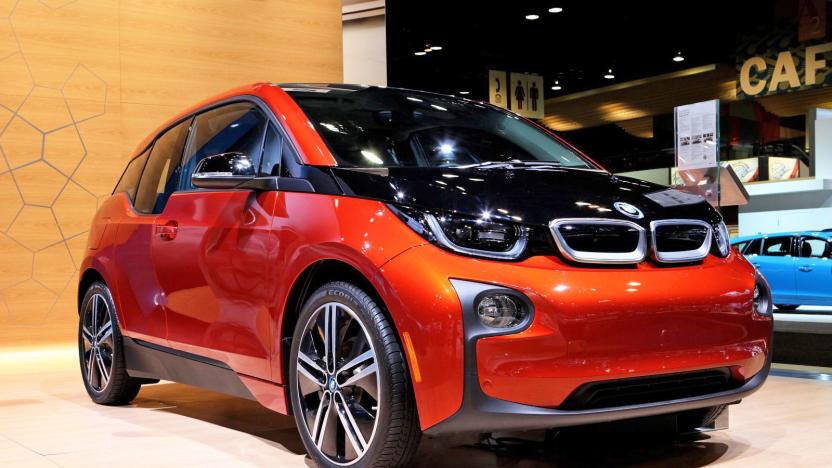
BMW will reportedly unveil an i3 redesign in 2017
BMW might not be waiting for the distant future to step up its electric car plans. Welt sources claim that the automaker plans the 2017 launch of a redesigned i3 that promises both practical and cosmetic improvements. You should see a new battery that significantly extends the range of the car beyond its recently increased 186-mile (with range extending motor) cap. It's not clear how much further you'll drive, but the difference will be "noticeable" -- just not as big a leap as the 50 percent hike from the last upgrade. In other words, it's likely enough to cover an extra commute, or to get you to a town that's just out of reach today.

Tesla self-driving demo shows you what the car sees
Sure, Tesla's first demo of full self-driving features was intriguing. But did you wonder what it was like from the car's point of view? You're about to find out. Tesla has posted another demo video that shows what an autonomous EV sees as it navigates local roads. As the clip illustrates, the cameras and sensors have to detect many, many different objects at any given moment: road lines, signs, lights, pedestrians and cars are among the many examples. The car even captures the "motion flow" of the environment to get a sense of where it's going.




